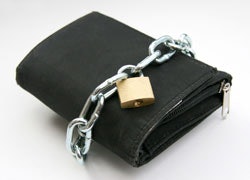Nobody likes to think about it much, but how secure is your fitness facility? Are you prepared for emergencies?
 Photo of a locked wallet
Photo of a locked walletNobody likes to think about it much, but how secure is your fitness facility? Are you prepared for emergencies? Are you doing what you can to prevent thefts and other crimes on your premises, or to at least help resolve problems if anything does occur?
After 15 years in business, we experienced our first onsite thefts this year. On two occasions, women had credit cards and cash stolen from their purses. The victims took responsibility for what happened, because they left their purses open, unsecured and within easy reach of other members. Naturally, after the fact, we posted signs and reminded members to lock their belongings or leave valuables at home or in the locked trunk of their vehicle.
But here's what really bothered us: If we had been taking photos of our members for our database records, like we're supposed to be doing, we very likely could have identified the thief. We knew when the thefts occurred. We could determine who was in the facility at those times based on check-in data, and we had descriptions of who was around the purses. But we couldn't reasonably accuse members without a proper ID.
We've had other incidents occur over the years - near-fights in the parking lot, a guy who tried to steal from the men's locker room during a tour (really!) - and we're sure other clubs have experienced them, too. From petty thefts to a nightmare such as a shooting (as occurred at an LA Fitness in western Pennsylvania in 2009), anything can happen when hundreds or thousands of people enter your facility every day. Are you doing what you can to prevent crime? Here are some ideas:
-
Take photos of all members, and require photo IDs for all guests. As we said, we are supposed to be taking digital photos of all our members. Doing so enhances customer service, and it also prevents people from entering with someone else's card key. We got lazy with it because we're confident that our staff does a great job getting to know our members, and we never thought about having to ID someone. So, it's time to get back to that.
We also require photo IDs for all guests and short-term members, which we photocopy. Doing so adds an air of formality to the process of registering a guest or short-timer, and hopefully discourages any ill-intentioned behavior from people we don't know.
- Get to know your local cops. We offer discounted memberships to our local public servants, including police officers, firefighters and EMTs. Many local officers work out with us, and we enjoy having them. The little things they do, such as regularly patrolling our parking lots during off-hours, are valuable to us, and when we reported our recent crimes it was helpful to have relationships with the officers.
- Empower your staff. Our staff knows that they "own" the facility when they are on duty. If they need to kick someone out, call 911 or deny entry to a day visitor who can't present a photo ID, they are empowered to do so. We were proud of our staff person who asked a member to stop showing off his new gun and to please put it back in his car, and the employee who demanded that two young people go get their photo IDs before they would take their day fees (the two left, and did not come back). We assure our staff that while we will, of course, review the circumstances and the employees' actions, we will never reprimand them for making real-time decisions that they feel are in the best interest of our members or the facility.
-
Control access. Most clubs don't allow prospects to wander around unaccompanied, but what about the person who says, "My wife is working out and I'm waiting for her. Can I use your bathroom?" You'd like to think your staff would ask, "May I ask for your wife's name?" and then make sure she's there. Then, under the guise of customer service but also for security's sake, your staff person would say, "Let me show you where the bathroom is," and escort the person inside.
But, most staff people won't. They'll say, "Sure, the locker rooms are over there," and off will go your unaccompanied visitor.
- Make security everyone's business. We recently visited a large club and asked to look around. We were allowed to do so by ourselves, and walked around in our street clothes. There were group fitness classes going on, people in the pool and kids in the childcare area. Not one person asked us why we were there, yet every personal trainer on the floor looked at us with a skeptical face. They knew something was wrong with us being there, but none of them simply said to their client, "Excuse me for a second," in order to approach us to see what we were doing and if we needed any help.
The most important security element for a health club is establishing an environment in which criminal activity is discouraged. Like the existence of an alarm system (and we hope you use one) or video surveillance, your atmosphere can prevent problems. Can you for sure stop the guy who helps himself to an open purse or is crazy enough to open fire, as happened at LA Fitness? Probably not. But you can prevent most incidents by knowing what's going on at all times, having an empowered staff and taking steps to identify everyone entering your facility.



































